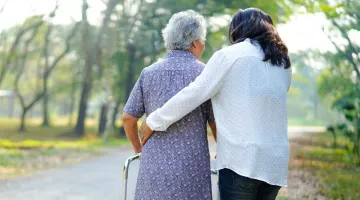Menu - Long Term Services and Supports (LTSS)
About 14 million adults in the United States need home and community-based services (HCBS) to maintain their independence and support their quality of life. The ability to access long-term services and supports at home — both paid and unpaid — is essential to maintaining the physical and mental health and well-being of older adults and adults with disabilities.
As Californians age and more people live longer with multiple chronic and disabling conditions, health and social care program administrators must anticipate and plan delivery of supportive services that respond to the needs of a rapidly growing and diversifying population.
Supportive programs provided to older adults and adults with disabilities at home and in the community are essential to maintaining physical and mental health. As the state continues to implement its Master Plan for Aging, it is critical that gaps in access to long-term services and supports are addressed.
A follow-on survey of the 2019–2020 California Health Interview Survey (CHIS), the Long-Term Services and Supports (LTSS) Study was developed to understand the services and supports needs of Californians who experience difficulties with certain activities of daily life.
From dressing and bathing to walking and doing errands, the LTSS Study examines the types of services and supports people are aware of, what services or supports they are using, and how well their individual needs for assistance are being met.
LTSS at a Glance
2 in 5
older adults and adults with disabilities reported that they had cut down on the amount they spent on food and/or saving for retirement
40%
of adults with disabilities and older adults in California who need assistance with routine or personal care could use more help or received no help at all
243,400
Medi-Cal recipients were likely eligible for Community-Based Adult Services (CBAS) in 2020, more than 6 times the number who were actually served by CBAS



















